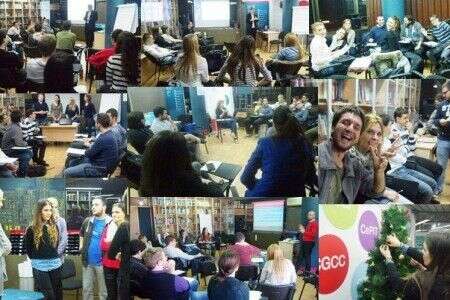Students of XXII generations of the Future Studies, organized by the Department for Advanced Undergraduate Studies of Belgrade Open School, had the opportunity to listen the lectures on two modules – Future of the State and Society and the Future of Europe during the fall semester 2014/2015.
Module the Future of the State and Society was aimed to familiarize students with the values of civil society and the great changes in the state and society, and to encourage them to participate in building a modern, democratic society in Serbia. From October to December 2014, at BOS discussed the "Short History Of The Future", "Global Trends And The Modern World", "Direct Democracy And The Restoration Of Freedom", "Mechanism Of The Rule Of Corporations And The Future Of Democracy", "The Future of the Citizen". We wondered whether we live today a negative utopia, and what about "The Future of Constitutionalism." Then we talked about "The Political Significance of Religious and Ethnic Identity in the Age of Multiculturalism", "Man Of The XXI Century And The Challenges Of Religiosity", "The Future Of International Relations", "Wars And Security In The Future", "Identity In The Future", "Feminization Or Masculinization Of Humanity: The Future Of Gender Equality", "The Future Of National Identity". We talked about "The Role Of The Internet And Social Networks"; we wondered who controls the internet community, and what about "The media and Their Role In Creating The Future", "Figures, Moving Images And Future", "The Challenge of Culture of the Future," "Knowledge Society As A Basic Resource Of The Future" and concluded discussing how it will look "Leadership the Future". We hosted: Vladimir Petrović, Dražen Maravić, Vladimir Milutinović, Miša Đurković, Vladimir Pavićević, Dragan Živojinović, Milan Sitarski, Sara Golic, Marijana Ajzenkol, Dušica Stojanovic Čvorić, Svetislava Bulajić, Momir Turudić, Iva Nenić, Marina Simić, Adriana Zaharijević, Jelena Volić-Hellbusch, Slobodan Antonić, Jovana Tripunović, Stanko Crnobrnja, Milan Vlajčić, Tamara Biljman, Dragica Pavlović Babić and Tony O'Brien.
Module Future of Europe from the very beginning was different. He began with the test of knowledge of European integration and with intensive program "The Basics of the European Union." Then we through lectures and workshops had been working on achieving the objective of this module – to enable students to think critically about the future direction of development of Europe. We had known each other better by talking about "Community Culture Instead of the Community of Nations", "Political Culture as an Obstacle Modernization", "The Problem of Sovereignty and the Challenges of Further Political Unification" and had the debate about the film "Euromania". Just after we talked about "The Future of Subsidiarity", "Principles of Multilevel Governance in the EU", we wondered "Is Ant Rose?" and "Where are the Stars of the North Atlantic Compass?". Through the workshop, we addressed the question of "European Neighbourhood Policy" and "Who should choose Europe as a Partner in the East?“. During the coming periods we have touched the "Resource Management on the Continent of Europe" and "Europe of Smart Cities". Then we talked about Europe in the network, the personal data in the online sphere, politics savings and solidarity in the EU, jobs of the future in Europe. We were approaching the end of the module, and an indispensable part were the topics on the perception of the citizens of Serbia on EU and whether it is today predominantly absence of critical thinking in the process of European integration, as well as the current position of Serbia in the process of negotiations with the EU. Our associates on the module Future of Europe were: Zdravko Ilić, Vladimir Vuletić, Ivana Gačanović, Marko Vujačić, Vladimir Pavlović, Danijela Božović, Vanja Dolapčev, Natan Albahari, Jelena Babić, Aleksandar Kovačević, Mirko Popović, Strahinja Mavrenski, Srdjan Barišić, Marko Malović, Jovan Protić, Stefan Eftimovski, Ivan Milenković, Srdjan Majstorović and Milica Saračević.
In addition to the core modules the students are socialized during special lectures and presentations, training of managed career, writing a proposal for a policy paper and academic writing. Indispensable were: psychological workshops, lectures of Spanish language, socializing and movie marathon.
Belgrade Open School wants to thank: Zoran Ćirjaković, Sanja Nikolin, Aleksandra Vladisavljević, Slobodan Marković, Jelena Manić Radoičić, Tamara Kljajić, Dušica Vilov, Maji Balović, Ani Bajat, Anki Marjanović Radonjić.
Activities in the second semester are scheduled for mid-February 2015.

